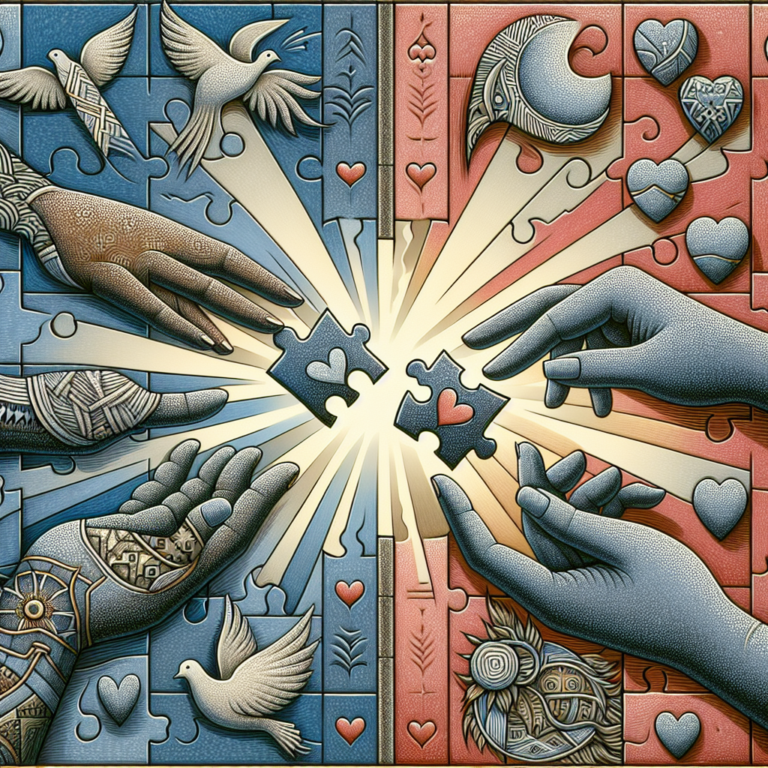
Introduction
In a world rife with conflict and misunderstandings, the act of forgiveness often feels like climbing Mount Everest. The emotional toll of holding onto grudges can weigh heavy on the heart and mind. But what if the secret to forgiving others lies not in their actions but in the depths of our own hearts? Why forgiving others starts with forgiving yourself is a concept that resonates strongly with anyone who has felt the pain of betrayal, disappointment, or unresolved conflict. This journey toward forgiveness is not simply an act of kindness towards others; it is a powerful step in liberating ourselves from the shackles of resentment.
Forgiveness is a multifaceted process, one that requires introspection, compassion, and, most importantly, self-acceptance. This article aims to delve into why forgiving others starts with forgiving yourself, providing you with unique insights and actionable steps to embark on this transformative journey. From case studies to practical tips, we will explore how embracing self-forgiveness can revolutionize your relationships and overall well-being.
Understanding Forgiveness
What Is Forgiveness?
At its core, forgiveness is the conscious decision to let go of resentment and thoughts of revenge. It doesn’t necessarily mean forgetting the offense or excusing the hurtful behavior. Rather, forgiveness involves recognizing the emotional burden of grudges and choosing a path of healing.
The Role of Self-Forgiveness
Self-forgiveness forms the foundation upon which the act of forgiving others can be built. When we struggle to forgive ourselves for past mistakes, we often project that anger and resentment onto others. The inability to accept our own flaws leads to a cycle of blame and conflict, ultimately impacting our relationships and mental health.
The Cycle of Resentment
How Resentment Manifests
Resentment can manifest in various ways, often clouding our judgment and inhibiting our ability to empathize with others. When we hold onto grudges, our emotional state becomes tethered to past grievances, making it challenging to cultivate healthy connections.
Case Study: The Impact of Resentment on Relationships
Emily’s Story
Emily, a 34-year-old marketing executive, found herself in a strained relationship with her younger sister after a significant fallout over a family incident. Instead of addressing her lingering anger, Emily harbored resentment, which seeped into other areas of her life. This case illustrates how unresolved issues can affect relationships and personal well-being.
Analysis: Here, Emily’s story serves as a poignant example of how failing to forgive oneself can lead to ongoing resentment, ultimately impacting her ability to forgive her sister.
The Connection Between Self-Forgiveness and Forgiving Others
A Psychological Perspective
Research in psychology highlights a profound connection between self-forgiveness and forgiving others. Studies suggest that individuals who can extend compassion to themselves are more likely to show empathy and understanding toward others.
Case Study: Transformative Effects of Self-Forgiveness
Mark’s Journey
Mark, a 45-year-old divorced father, struggled with guilt over his past mistakes in his marriage. Through therapy, he learned to forgive himself, leading to a healthier co-parenting relationship with his ex-wife.
Analysis: Mark’s journey underscores the importance of self-forgiveness as a catalyst for improving interpersonal relationships. By accepting his past, Mark was better equipped to approach his ex-wife with empathy, ultimately leading to a more harmonious dynamic.
Steps to Embrace Self-Forgiveness
Step 1: Acknowledge Your Feelings
The first step is to recognize and validate your emotions. Denying feelings of guilt or shame only exacerbates the problem. Accept that these emotions are part of being human.
Step 2: Reflect on Your Actions
Take time to analyze your behavior and the context surrounding it. Consider what led to your actions and how they correlate with your values.
Step 3: Cultivate Self-Compassion
Practice self-compassion by reminding yourself that everyone makes mistakes. Approach self-forgiveness with kindness rather than harsh criticism.
Step 4: Make Amends
If possible, try to make amends to those you may have hurt. Taking responsibility can ease feelings of guilt and pave the way for forgiveness.
Step 5: Let Go of Perfectionism
Recognize that perfectionism is unattainable. Embrace your imperfections as part of your unique journey.
Why Forgiving Others Starts with Forgiving Yourself
The Ripple Effect
When you understand why forgiving others starts with forgiving yourself, you begin to experience a ripple effect in your emotional landscape. The release of self-imposed burdens allows you to approach others with an open heart.
Emotional Freedom
Letting go of resentment ignites a sense of emotional freedom. This newfound clarity helps you forgive others genuinely, fostering healthier connections.
Case Study: The Power of Emotional Freedom
Sarah and Jake
Sarah and Jake, a couple in couples therapy, struggled with trust issues rooted in past betrayals. As they both learned to forgive themselves, they found that their ability to forgive each other flourished.
Analysis: Their story showcases the transformative power of emotional freedom gained through self-forgiveness, enabling a deeper understanding and connection.
Actionable Insights: How to Forgive Others Once You’ve Forgiven Yourself
Develop Empathy
Understanding the motivations behind someone else’s actions can pave the way for forgiveness. Practice empathy by putting yourself in their shoes.
Communicate Openly
Engage in open and honest communication with those you wish to forgive. This dialogue can provide closure, both for you and the other person.
Practice Mindfulness
Mindfulness can help you stay present, reducing the tendency to dwell on past grievances. Regular meditation or deep-breathing exercises can be beneficial.
Seek Professional Support
Consider seeking professional help if you struggle with forgiveness. Therapists can provide tools and strategies tailored to your unique situation.
Conclusion
In summary, the idea that forgiving others starts with forgiving yourself is not merely a catchphrase; it’s a profound truth that can alter the course of your relationships and emotional well-being. By engaging in the journey of self-forgiveness, you can break the cycle of resentment and embrace a life filled with empathy, joy, and healthier connections.
As you embark on this path, remember that true liberation begins within. By forgiving yourself, you invariably create the space to forgive others, leading to a more fulfilling and harmonious existence.
FAQs
What does it mean to forgive yourself?
- Forgiving yourself involves acknowledging your mistakes, accepting your humanity, and choosing to let go of feelings of guilt or shame associated with those mistakes.
Can I forgive others without forgiving myself first?
- While it’s possible, it often leads to unresolved issues. True forgiveness involves self-acceptance, which allows for healthier relationships.
How can I begin the process of self-forgiveness?
- Start by acknowledging your emotions, reflecting on your actions, cultivating self-compassion, making amends, and letting go of perfectionism.
Why is empathy important in forgiveness?
- Empathy allows you to understand the perspectives and experiences of others, making it easier to forgive them for their actions.
- What should I do if I struggle with forgiving myself or others?
- Seeking support from friends, family, or professionals can provide guidance and tools to navigate the complex emotions associated with forgiveness.
Embrace this transformative journey; the freedom that comes from forgiveness can illuminate every corner of your life.















